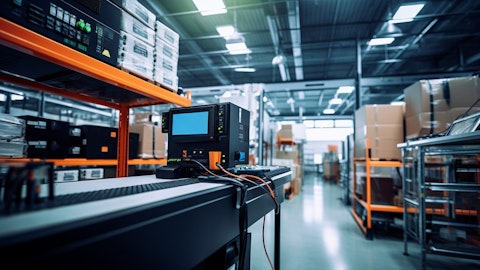Nine Energy Service, Inc. (NYSE:NINE) Q1 2025 Earnings Call Transcript May 10, 2025
Heather Schmidt – VP, Strategic Development and IR:
Ann Fox – President & CEO:
Guy Sirkes – SVP & CFO:
Waqar Syed – ATB Capital Markets:
John Daniel – Daniel Energy Partners:
Operator: Greetings, and welcome to Nine Energy Service First Quarter 2025 Earnings Conference Call. At this all participants are in a listen-only mode. A question and answer session will follow the formal presentation. [Operator Instructions] As a reminder, this call is being recorded. I would now like to turn the conference over to your host, Heather Schmidt, Vice President of Strategic Development and Investor Relations.
Heather Schmidt: Thank you. Good morning, everyone, and welcome to the Nine Energy Service earnings conference call to discuss our results for the first quarter of 2025. With me today are Ann Fox, President and Chief Executive Officer; and Guy Sirkes, Chief Financial Officer. We appreciate your participation. Some of our comments today may include forward-looking statements reflecting Nine’s views about future events. Forward-looking statements are subject to a number of risks and uncertainties, many of which are beyond our control. These risks and uncertainties can cause actual results to differ materially from our current expectations. We advise listeners to review our earnings release and the risk factors discussed in our filings with the SEC.
We undertake no obligation to revise or update publicly any forward-looking statements for any reason. Our comments today also include non-GAAP financial measures. Additional details and a reconciliation to the most directly comparable GAAP financial measures are also included in our first quarter press release and can be found in the Investor Relations section of our website. I will now turn the call over to Ann.
Ann Fox: Thank you, Heather. Good morning, everyone. Thank you for joining us today to discuss our first quarter results for 2025. Revenue for the quarter was $150.5 million, which was in the upper range of our original guidance of $146 million to $152 million and an increase of approximately 6% versus Q4. We generated adjusted EBITDA of $16.5 million, an increase of approximately 17% quarter-over-quarter. Incremental adjusted EBITDA margins were approximately 26%. We had a strong quarter relative to the market as we continue to execute our strategy of market share gains and cost reductions. The U.S. land market was relatively stable in Q1, with the U.S. rig count remaining flat versus Q4. Despite this, we generated revenue growth within all of our service lines and generated incremental EBITDA margins of approximately 26%, driven in large part by increased activity from our market share gains, most specifically within cementing.
Additionally, we did not have the negative impacts of holidays, weather and budget exhaustion we saw in Q4, resulting in more efficient operations and less white space, most evident in our coiled tubing division, where we increased revenue by approximately 16% quarter-over-quarter. Pricing across service lines was mostly stable in Q1 with the exception of our wireline operations in the Northeast, where we saw the impact of lower stage pricing implemented during the bidding process in 2024. As I mentioned, our total revenue grew by approximately 6% quarter-over-quarter with our cementing business increasing its revenue by approximately 4% and jobs completed by approximately 11% despite a flat rig count environment and sustained low activity levels in the Haynesville.

Completion tool revenue for the quarter increased due to market share gains in the Permian Basin with our Plug offering. Our technology continues to perform very well, and we continue to be a premier completion tool provider for the U.S. and abroad. Our U.S. Wireline division increased revenue by approximately 7% quarter-over-quarter due in large part to more efficient operations in the Northeast as budgets reset and we did not have the impact of holiday shutdowns. We have seen stage price reductions in the Northeast as we repriced work for 2025 bids completed during a lower natural gas price in 2024. Coiled tubing revenue increased by approximately 16% this quarter. Utilization was significantly higher in Q1 versus Q4, driving an increase in both revenue and profitability quarter-over-quarter.
I would now like to turn the call over to Guy to walk through detailed financial information.
Guy Sirkes: Thank you, Ann. Before I walk through Q1 results, I want to discuss the recent refinancing of our ABL revolving credit facility. On May 1, we closed on a new asset-based revolving credit facility with White Oak Commercial Finance due November 2027. The new ABL will provide us with $125 million of commitments and a $50 million uncommitted accordion and will replace the company’s previous revolving credit facility. Based on our March borrowing base and excluding one-time transaction costs, the new facility provides Nine with approximately $22 million of incremental covenant compliant liquidity through an increase in our borrowing base of approximately $14.4 million as well as lowering our fixed charge coverage ratio at trigger level by approximately $7.5 million.
Additionally, the new ABL extends the previous maturity by approximately 9 months to November 2027. We estimate the new ABL will increase our annual cash interest expense by approximately $1 million. The combination of additional borrowing base availability and lower fixed charge covenant ratio trigger levels significantly increases our liquidity and financial flexibility, and we are excited about our new partnership with White Oak. A summary of the terms are contained within the company’s recent filing with the SEC, and there is a supplemental presentation that can be found in the Investor Relations section of our website. As of March 31, 2025, Nine’s cash and cash equivalents were $17.3 million with $36.5 million of availability under the previous revolving ABL credit facility, resulting in a total liquidity position of $53.8 million as of March 31, 2025.
At March 31, we had $47 million of borrowings under the ABL credit facility. During Q1, we did not sell any shares under the ATM program. As per the terms of the indenture governing 9 senior secured notes, the company is required to periodically offer to repurchase such notes with a portion of any excess cash flow. Nine did not generate any excess cash flow as defined in the indenture in the most recently ended two fiscal quarters. As a result, no excess cash flow offer will be made to noteholders this month. During the first quarter, revenue totaled $150.5 million with adjusted gross profit of $28 million. During the first quarter, we completed 1,245 cementing jobs, an increase of approximately 11%. The average blended revenue per job decreased by approximately 6%.
Cementing revenue for the quarter was $57.2 million, an increase of approximately 4%. During the first quarter, we completed 7,713 wireline stages, an increase of approximately 15%. The average blended revenue per stage decreased by approximately 7%. Wireline revenue for the quarter was $29.6 million, an increase of approximately 7%. For completion tools, we completed 29,057 stages, an increase of approximately 14%. Completion tool revenue was $33.9 million, an increase of approximately 2%. During the first quarter, our coiled tubing days worked increased by approximately 36% with the average blended day rate decreasing by approximately 15%. Coiled tubing revenue was $29.9 million, an increase of approximately 16%. During the first quarter, the company reported general and administrative expense of $13.3 million.
Depreciation and amortization expense was $8.6 million. The company’s tax provision was approximately $0.1 million for the first quarter of 2025. The provision for 2025 is the result of the company’s tax position in state and non-U.S. tax jurisdictions. For the first quarter, the company reported net cash used in operating activities of $5.3 million. The average DSO for Q3 was 57.6 days. CapEx spend during Q1 was $4.3 million, and our full year CapEx budget remains unchanged at $15 million to $25 million. I will now turn it back to Ann.
Ann Fox: Thank you, Guy. The recent decline in oil price in conjunction with increased costs due to tariffs has created uncertainty for the energy industry and global markets. It is too early to understand the timing and totality of these impacts and what customer plans and U.S. activity levels will look like moving forward. Things can change quickly, and we are planning for every scenario. Commodity prices will impact activity levels, and our customers are currently in the process of evaluating plans. With the recent OPEC announcement, oil prices have fallen, and we are waiting to see the magnitude of operator reaction. We have seen supportive natural gas prices in Q1, but activity levels in the natural gas basins have remained flat thus far.
We are optimistic on the long-term outlook for natural gas and the positive impacts it could have on Nine’s earnings. Tariffs will directly impact Nine as well as the overall industry. We are most impacted by tariffs in our wireline division with our perforating guns and coiled tubing with our reels and with some of our component parts for our tools. We have already begun having pricing conversations with our customers and are simultaneously evaluating alternative sources of materials to offset some of these cost increases. In May, we began to see some activity declines as well as pricing pressure, specifically in the Permian Basin. As previously discussed, forward-looking plans are still very uncertain. But with what we know today, we anticipate both revenue and adjusted EBITDA to decline compared to Q1 and project Q2 revenue between $138 million and $148 million.
This team has navigated uncertainty before, and we are prepared to pivot with market changes. We are ready to capitalize on any market growth in the natural gas levered basins, and our diversity in geography and commodities remain an important differentiator for Nine. We will continue to focus on executing our strategy, the development of our technology and maintaining our service quality and execution at the well site. Before we open up the call for Q&A, I wanted to mention the recent appointment of Joey Hall to the Board of Directors. As previously announced, the Board had made a strategic decision to change the composition and size of the Board. We knew it was crucial to have an upstream and industry expert on the Board, and we are confident Joey will bring deep experience and insights to the markets we serve.
He most recently served as the Executive Vice President of Operations for Pioneer Natural Resources, and we are very excited to welcome him to the Board. We will now open up the call for Q&A.
Q&A Session
Follow Ninetowns Internet Tech Grp Co (NYSE:NINE)
Follow Ninetowns Internet Tech Grp Co (NYSE:NINE)
Receive real-time insider trading and news alerts
Operator: [Operator Instructions] Our first question comes from Waqar Syed with ATB Capital Markets. Please proceed with your question.
Waqar Syed: Thank you. Good morning. Ann my question relates to pricing pressures that you mentioned. Could you maybe provide some details around that? Which business line is being most impacted and maybe quantify some of the magnitude of the impact?
Ann Fox: So it’s still very early, Waqar, to try and quantify the magnitude. I would say this pricing pressure is largely related to West Texas activities. We’re seeing some pressure in the cementing division. I think it’s relative to kind of the upset with the tariffs that has occurred. Obviously, that’s not just specific to our industry, but part of it is that where you’re having to go in and have conversations with your customers around tariff impacts. And then the other piece is just the commodity price what our customers are facing and what they’re looking at. So we started to see that primarily in West Texas. And I would just add to that, that — and I think you’ve probably heard this from so many of our peers and then just other industries at large, it’s really too early, I think, for any of us to understand these impacts, which may be small and they may not be.
I mean, obviously, we’re waiting for trade agreement announcements today with the U.K. We’ve got — the administration has meetings with the Chinese this weekend. So as you know, these things can rapidly change, and that’s important. If you look at our Q2 guidance, we’ve debated back and forth on really what that number looks like because the uncertainty is so strong for June, just given everything that we’re waiting on to see, April was a very strong month for us. And if we had to run rate the quarter on April, we would have given stronger guidance. May is a good month. I think what you’re seeing is a lot of companies are trying to say, hang on a second, there’s some uncertainty coming. We want to be transparent. We don’t want to be misleading, but nobody has actually come off a cliff yet, right?
And so — and that cliff may not be there. It just depends what comes out of — it largely depends what comes out of Washington and what happens to these commodity prices. So I don’t want to paint some picture of certainty that we don’t have. We are trying to be cautious and conservative.
Waqar Syed: Sure. And in the oil industry, like almost between the $62 oil price and $58 oil price may not be as huge magnitude difference. But optically for operators, it’s a big difference when you have a $5 handle on commodity prices or oil prices. The current guidance that you’ve provided, is it more kind of a low 60s guidance? Or you think it’s more of a below $60 oil price, like $58, $59 oil price staying over the next three, six months?
Ann Fox: You know what Waqar, I think it’s still early to say. And I think, obviously, as you said, it’s — the near-term oil prices matter. Obviously, the forward strip matters, what is the certainty in the market? What do we think is coming with global demand, global production? So I would say this is just thoughts on the Q2 outlook. We’re not providing any guidance going forward. And obviously, as you know, a $50 price is very different than a $60 price. It’s very different than a $70 price. And it’s really important to note, our customers are doing this evaluation real time themselves, right, and trying to figure out what will be their cash returns to the street, what are their production goals, how do they manage tariffs if they stick, right, if the tariffs stick. So I think it’s way too early for me to answer that question. So specifically, I can just give you the color I gave you on Q2.
Waqar Syed: Sure. I appreciate that. And then you also talked about like tariff-related impact on components that have a lot of steel, whether that’s coiled tubing or perforating guns. What is your ability to pass those extra costs over to the customer given that the customers are getting squeezed from low oil prices as well?
Ann Fox: Well, I think you’re so well versed in all things, oilfield service. And the service sector really at large does not have the capacity to absorb these tariffs. And so I think most of us will be going to our customers to absorb those tariffs. They are well understood. So unlike times in the past where you may face some organic issue relative to pricing, this is a matter that is well publicized and very transparent. So we are absolutely planning to pass those tariffs on. And I think, frankly, our customers understand that OFS does not have the capacity to absorb these tariffs. So we’re planning to pass those on. I think that’s been received, and those conversations are ongoing. Again, as you know, even this afternoon, that aluminum and steel tariff is in question with the U.K. So that’s just one example.
So I don’t want to be too certain about anything because at any month, we could see something lifted or we could see something eased or we could see something become more difficult.
Waqar Syed: Sure. And then the natural gas markets, whether that’s Haynesville or Appalachia, Northeast looks much better, the outlook there. And in your commentary, in the press release, there were some comments about relocation of equipment or refocus towards that. Could you maybe highlight that? What are you thinking along those lines?
Ann Fox: Yes. So we right now are not planning to relocate any equipment. I do know you’ve heard from some of our customers. You heard from Coterra specifically that they’ll focus their CapEx on the gas markets. But right now, we are not planning to relocate. As you know, we fought really hard when the average gas price last year was $2.19 to hang on to those gassy footprints. We’re so happy that we did because those are really nice bright spots for us right now. We do suspect and you kind of look at where the strip pricing is for gas, it’s a very happy place for our customers. So really excited about the gas markets for us going forward. But right now, we don’t have a plan to reallocate any assets or equipment.
Waqar Syed: And then just final question on your international completion tool sales. Were there anything there in Q1?
Ann Fox: I mean, yes, we had international sales there, and we’re really pleased with how our multicycle barrier valve is performing. Really pleased with our outlook for the international tool sales this year, definitely a very bright spot as well. So looking forward to that. As you know, we’re building a state-of-the-art completion tools facility in Texas, and that’s going to have every possible test capability that will help us serve the domestic market, but really will also help us meet some really tough and stringent requirements to continue to play and expand in the international market.
Waqar Syed: Great. Well, thank you very much. I appreciate the comments.
Ann Fox: Thank you so much, Waqar.
Operator: Our next question comes from John Daniel with Daniel Energy Partners. Please proceed with your question.
John Daniel : Good morning, guys. Thanks including me. And Waqar, man, he asks all the good questions. I missed some of your prepared remarks, Ann, so I apologize. But I was curious if you could speak to the Plug business and just we continue to see longer laterals — talks about 4-mile laterals in the Bakken, more people are testing it. Just look out 1 to 2 years, how do you see that demand playing out? And do you feel the same pricing pressures on sort of the technology offering versus the other stuff?
Ann Fox: Well, good morning, John, we always appreciate your questions and participation. I think when you look out — I’ll take the second question first. OFS seems to be — it doesn’t seem to have any immunity in any segment anywhere as it relates to pricing pressure. So when pricing pressure comes or you deal with a market like this, it seems to be universally applied. On the first question, we really love to see these long laterals. I mean it feels like every time we start talking about — it was a couple of years ago, we start talking about 4-mile laterals. Nobody gets too excited about it because they’re sparse and few and far between, and then that continues to increase. The complexity of the completions continue to increase.
As you know, the relentless focus on efficiency is there. So we are very excited that the technology requirements and demand will continue to go up on these frac plugs, which, as you know, are absolutely critical to the overall health and production and type curve of these wells. So we’re always after a plug that does the absolute best job isolating each stage, but also can dissolve quickly and lend to efficient operations for the customer. So we’re hyper focused on new innovations all the time as it relates to frac plugs. We love the outlook for demand. And we think that, that complexity will drive right to what we do best, which is to meet the need of really difficult technology innovation. So we’re excited about it, and it’s going to be a market mover for us for sure.
And I just will add there too, John, is that, as you know, just naturally, things like to dissolve in high temperatures. So I think the Haynesville is also going to be a nice basin for us moving forward over the next couple of years. So that’s exciting, too.
John Daniel: Okay. And then just a quick follow-up. As the international tool sales sort of accelerate over time, do you see any opportunities for that to be a pull-through for your other services? Is there — is it realistic to assume that you guys…
Ann Fox: No. I’ll be really clear about that. We have, at our size and scale, no interest in proliferating any, what I’ll call, bricks-and-mortar heavy equipment or human assets on the ground. So we are absolutely going after that international market from a product perspective and a technology perspective. And one of our number one goals is to expand our offering for the conventional wellbore. So we’re always happy to tap the unconventionals, but we’re actively working on that. And we have, what we would say in Massachusetts, a wicked smart Norwegian team of engineers over in Norway working on those tools. So very excited about that. Those guys are really second to none. So it’s something we don’t often talk about, but they’re actively working on it.
John Daniel: Okay, well thank you very much. And Joey is a good get. Congratulations.
Ann Fox: Yes. He’s an incredible got. So thank you so much. We feel extremely happy to have him join our Board. Thank you.
John Daniel: You bet. Bye-bye.
Operator: We have reached the end of the question-and-answer session. I’d now like to turn the call back over to Ann Fox for closing comments.
Ann Fox: Thank you for your participation in the call today. I want to thank our employees, our E&P partners and investors. Thank you.
Operator: This concludes today’s conference. You may disconnect your lines at this time, and we thank you for your participation.
Follow Ninetowns Internet Tech Grp Co (NYSE:NINE)
Follow Ninetowns Internet Tech Grp Co (NYSE:NINE)
Receive real-time insider trading and news alerts





